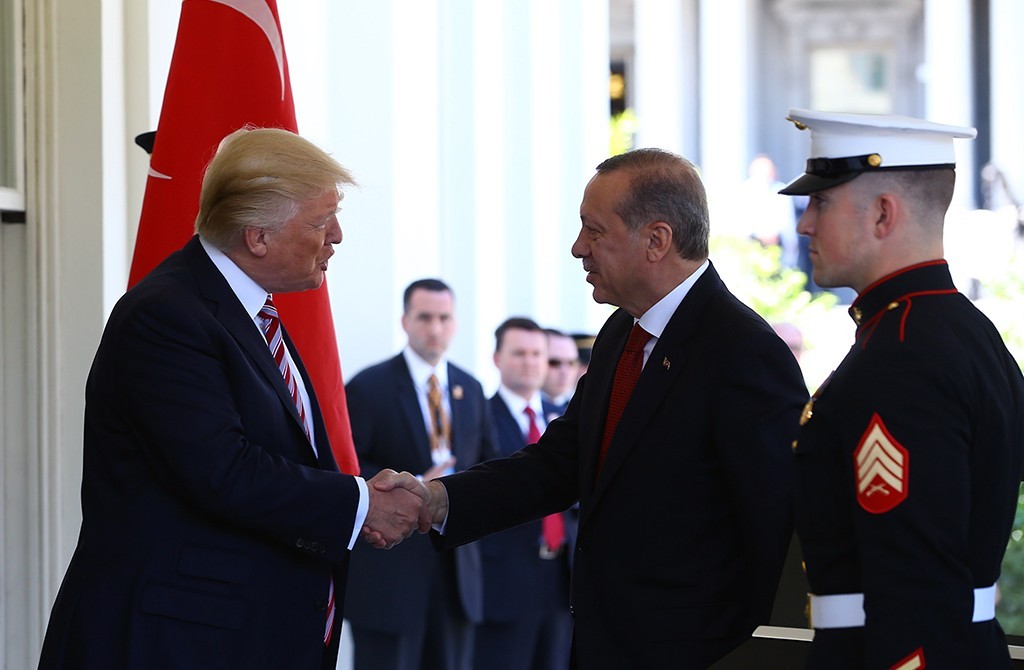President Recep Tayyip Erdoğan visited Paris over the weekend to attend a series of events that his French counterpart, Emmanuel Macron, hosted on the occasion of Armistice Day’s centennial. Provided that the Ottoman Empire disintegrated as a result of World War I, Erdoğan’s meetings with world leaders carried additional symbolic significance. First of all, the Turkish president traveled to France as an empowered player in the international arena.
The Four-Nation Summit, which took place in Istanbul earlier this month, has given him additional clout over the Syrian theater. In addition to securing German and French support for the Idlib agreement, the Turkish leader has been negotiating the final details of the Syrian constitutional committee with the Russians. At the same time, he raised concerns about the situation east of the Euphrates River to mount pressure on Washington. Erdoğan also captured the moral high ground in international politics by managing the aftermath of Saudi journalist Jamal Khashoggi’s murder with great skill.
He not only prevented a cover-up of what happened but also made it extremely difficult for U.S. President Donald Trump to stick with his close ally, Saudi Crown Prince Mohammad bin Salman, who happens to be the chief suspect in the Khashoggi investigation. Without a doubt, future steps regarding the Khashoggi slaying were an important item on the agenda of world leaders visiting Paris over the weekend. Curiously enough, not only Trump but also Macron and Russian President Vladimir Putin seem eager to make the Khashoggi murder go away. Erdoğan, by contrast, has used public opinion to compel Western leaders to take some kind of action.
During his stay in Paris, Erdoğan held talks with Trump and Putin. The Turkish and U.S. presidents met in person for the first time since the release of Andrew Brunson from a Turkish prison. Going forward, they will rely on leader-to-leader diplomacy to facilitate a rapprochement between their nations on the Khashoggi murder, the situation in Manbij and east of the Euphrates River, the Iran sanctions, the Halkbank file, the Gülenist Terror Group (FETÖ), Turkey’s plans to purchase the S-400 air defense system and the pending delivery of F-35 fighter jets. Although Trump was quick to spin the midterm elections as a victory, the Republicans lost their majority in the House. Meanwhile, Trump was able to strengthen his grip on the GOP by helping his allies win seats.
Under domestic pressure from the Democrats, President Trump might be willing to take new steps in foreign policy, especially on Iran and China. He might block impeachment proceedings by fueling international tensions to get himself re-elected. Going back to the so-called deal of the century could be a quick way to accomplish that goal.
Yet it would be difficult to make the case that Trump has made significant progress in the Middle East after two years in office. The administration was forced to grant waivers to more countries than originally intended to avoid a rise in oil prices. The Middle East Strategic Alliance, which Trump wanted to form to contain Iran, hasn’t been working. Managing the complex disputes between Saudi Arabia, the United Arab Emirates (UAE), Kuwait, Qatar, Oman, Bahrain, Egypt and Jordan is not an easy task. To make matters worse, the Saudi crown prince, who, Washington hoped, would serve as the main pillar of the proposed alliance, has been (at least temporarily) weakened by the Khashoggi murder. According to a recent Reuters story, the January 2019 signing of a preliminary accord, which had been delayed repeatedly in the past, could be postponed yet again. Sooner or later, the Trump administration will have to accept that it cannot contain the Iranian, Russian and Chinese influences in the Middle East by creating an “Arab NATO” alone. Instead, Washington is compelled to align its regional policy with the priorities of Turkey, its NATO ally.
Those developments meant that a lot more than usual was riding on Erdoğan’s deliberations with Trump. For the time being, Washington and Ankara find themselves in a favorable position to hold talks. They must take constructive, concrete steps regarding potential flashpoints including the Iran sanctions and the future of the People’s Protection Units (YPG) east of the Euphrates River. Putting a bounty on three senior PKK leaders was a nice gesture, but it ultimately fell short of addressing Turkey’s concerns. The Turkish leadership is utterly frustrated with Washington’s continued partnership with YPG – the designated terrorist organization PKK’s Syrian branch. To smooth out those problems, Erdoğan and Trump will have to meet frequently. After all, Trump’s deal of the century and pending congressional action on the S-400 air defense system and the F-35 delivery to Turkey could fuel tensions in the near future.
Over the next two years, Trump will have to work much more closely with the Turkish president.
[Daily Sabah, 11 November]
In this article
- Opinion
- Bahrain
- China
- Daily Sabah
- Deal of the Century
- Donald Trump
- East of the Euphrates
- Egypt
- Elections
- Emmanuel Macron
- F-35 Fighter Jet Program
- France
- French President
- Gülenist Terror Group
- Idlib
- Islamic Republic of Iran
- Israel-United Arab Emirates peace agreement | The Abraham Accord
- Kurdistan Workers' Party Terrorist Organization (PKK)
- Kuwait
- Middle East
- Mohammed bin Salman (MBS)
- NATO
- NATO Ally
- People's Protection Units (YPG)
- PKK - YPG - SDF - PYD - YPJ - SDG - HBDH - HPG - KCK - PJAK - TAK - YBŞ
- Qatar
- Recep Tayyip Erdoğan
- Russia
- S-400 Triumph Air Defence Missile System
- Sanctions
- Saudi Arabia
- Saudi Crown Prince
- Syria
- Syrian Civil War
- Syrian Conflict
- Syrian Crisis
- Trump Administration
- Trump impeachment inquiry
- Turkish Foreign Policy
- Turkish President
- Turkish-American Relations
- Türkiye-US Relations
- Türkiye's Foreign Policy
- United Arab Emirates (UAE)
- United States (US)
- US President
- Vladimir Putin
- Western World

